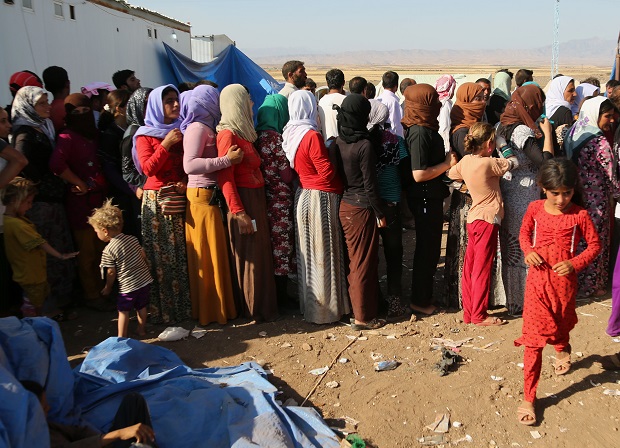UN says Syria refugees top 3-million mark

Displaced Iraqis from the Yazidi community gather for humanitarian aid at Nowruz camp, in Derike, Syria, Tuesday, Aug. 12, 2014. In the camps here, Iraqi refugees have new heroes: Syrian Kurdish fighters who battled militants to carve an escape route to tens of thousands trapped on a mountaintop. While the U.S. and Iraqi militaries dropped food and water to the starving members of Iraq’s Yazidi minority, the Kurds took it on themselves to rescue them, a sign of how Syria’s Kurds, like Iraq’s, are using the region’s conflicts to establish their own rule. AP/ Khalid Mohammed
GENEVA — The civil war in Syria has forced a record 3 million people out of the country as more than a million people fled in the past year, the U.N. refugee agency said Friday.
The tragic milestone means that about one of every eight Syrians has fled across the border, and 6.5 million others have been displaced within Syria since the conflict began in March 2011, the Geneva-based agency said. More than half of all those uprooted are children, it said.
“The Syria crisis has become the biggest humanitarian emergency of our era, yet the world is failing to meet the needs of refugees and the countries hosting them,” said U.N. High Commissioner for Refugees Antonio Guterres.
Syria had a prewar population of 23 million.
The recent surge in fighting appears to be worsening the already desperate situation for Syrian refugees, the agency said, as the extremist Islamic State group expands its control of broad areas straddling the Syria-Iraq border and terrorizes rivals and civilians in both countries.
Article continues after this advertisementAccording to the agency, many of the new arrivals in Jordan come from the northern province of Aleppo and the northeastern region of Raqqa, a stronghold of the group. An independent U.N. commission says the group is systematically carrying out widespread bombings, beheadings and mass killings that amount to crimes against humanity in both areas.
Article continues after this advertisementThe commission investigating potential war crimes in Syria said on Wednesday that the Syrian government of President Bashar Assad likely used chlorine gas to attack civilians, who are bearing the brunt of a civil war that has killed more than 190,000 people and destabilized the region.
The massive numbers of Syrians fleeing the civil war has stretched the resources of neighboring countries and raised fears of violence spreading in the region.
The U.N. estimates there are nearly 35,000 people awaiting registration as refugees, and hundreds of thousands who are not registered.
International Rescue Committee President David Miliband said the Syrian refugee crisis represents “3 million indictments of government brutality, opposition violence and international failure.”
“This appalling milestone needs to generate action as well as anger,” he said, calling for more aid to Syria’s overburdened neighbors and for civilians still in the country.
The refugee agency and other aid groups say an increasing number of families are arriving in other countries in shockingly poor condition, exhausted and scared and with almost no financial savings left after having been on the run for a year or more. In eastern Jordan, for example, the agency says refugees crossing the desert are forced to pay smugglers $100 per person or more to be taken to safety.
Lebanon hosts 1.14 million Syrian refugees, the single highest concentration. Turkey has 815,000 and Jordan has 608,000.